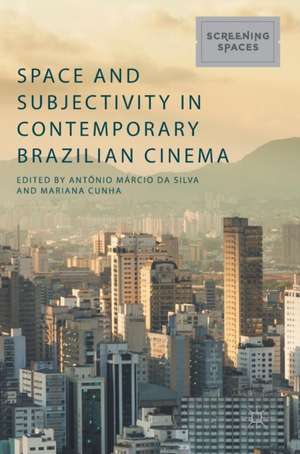Space and Subjectivity in Contemporary Brazilian Cinema: Screening Spaces
Editat de Antônio Márcio da Silva, Mariana Cunhaen Limba Engleză Hardback – 23 aug 2017
| Toate formatele și edițiile | Preț | Express |
|---|---|---|
| Paperback (1) | 467.23 lei 38-44 zile | |
| Springer International Publishing – 3 aug 2018 | 467.23 lei 38-44 zile | |
| Hardback (1) | 702.24 lei 6-8 săpt. | |
| Springer International Publishing – 23 aug 2017 | 702.24 lei 6-8 săpt. |
Preț: 702.24 lei
Preț vechi: 826.16 lei
-15% Nou
Puncte Express: 1053
Preț estimativ în valută:
134.43€ • 138.33$ • 113.32£
134.43€ • 138.33$ • 113.32£
Carte tipărită la comandă
Livrare economică 01-15 martie
Preluare comenzi: 021 569.72.76
Specificații
ISBN-13: 9783319482668
ISBN-10: 3319482661
Pagini: 231
Ilustrații: XI, 244 p. 26 illus., 22 illus. in color.
Dimensiuni: 148 x 210 mm
Greutate: 0.57 kg
Ediția:1st ed. 2017
Editura: Springer International Publishing
Colecția Palgrave Macmillan
Seria Screening Spaces
Locul publicării:Cham, Switzerland
ISBN-10: 3319482661
Pagini: 231
Ilustrații: XI, 244 p. 26 illus., 22 illus. in color.
Dimensiuni: 148 x 210 mm
Greutate: 0.57 kg
Ediția:1st ed. 2017
Editura: Springer International Publishing
Colecția Palgrave Macmillan
Seria Screening Spaces
Locul publicării:Cham, Switzerland
Cuprins
Chapter 1: Introduction.- Chapter 2: Tikmũ’ũn’s Caterpillar-Cinema: Off-screen Space and Cosmopolitics in Amerindian Films.- Chapter 3: The Reterritorializations of Urban Space in Brazilian Cinema.- Chapter 4: Mapping from the Margins: The Films of Beto Brant.- Chapter 5: Bodies in Landscape: The Scientist’s Presence in Viajo porque preciso, volto porque te amo and Ventos de agosto.- Chapter 6: Intensive Spatium and the Construction of Child Subjectivities in Brazilian Cinema.- Chapter 7: Insolação: Subjective Perception of an Urban Utopia through the Lens of Love and Loss.- Chapter 8: Astral Cities, New Selves: Utopian Subjectivities in Nosso Lar and Branco sai, preto fica.- Chapter 9: Underneath the Surface, Embodied on Screen: Memory and Social Conflict in São Paulo’s Cityscape.- Chapter 10: The Space of Queer Masculinities in Karim Aïnouz’s Praia do Futuro.- Chapter 11: Water and Queer Intimacy.- Chapter 12: ‘Casa grande & senzala’: Domestic Space and Class Conflict in Casa grande and Que horas ela volta?.- Chapter 13: O som ao redor: Aural Space, Surveillance, and Class Struggle.
Notă biografică
Antônio Márcio da Silva currently teaches at the University of Surrey, UK. His publications include The “Femme” Fatale in Brazilian Cinema: Challenging Hollywood Norms (Palgrave 2014), contributions to the edited collections Directory of World Cinema: Brazil and World Film Locations: São Paulo and a number of articles.
Mariana Cunha is a Postdoctoral Research Fellow at the Federal University of Rio Grande do Norte, Brazil, where she is currently developing a research project on the relationship between landscape and embodiment in contemporary world cinema. She has taught Brazilian studies at Queen Mary University of London and the University of Oxford, UK.
Mariana Cunha is a Postdoctoral Research Fellow at the Federal University of Rio Grande do Norte, Brazil, where she is currently developing a research project on the relationship between landscape and embodiment in contemporary world cinema. She has taught Brazilian studies at Queen Mary University of London and the University of Oxford, UK.
Textul de pe ultima copertă
This collection explores the emergence of new spatialities and subjectivities in Brazilian films produced from the 1990s onwards, a period that became known as the retomada, but especially in the cinema of the new millennium. The chapters take spatiality as a powerful tool that can reveal aesthetic, political, social, and historical meanings of the cinematographic image instead of considering space as just a formal element of a film. From the rich cross-fertilization of different theories and disciplines, this edited collection engages with the connection between space and subjectivity in Brazilian cinema while raising new questions concerning spatiality and subjectivity in cinema and providing new models and tools for film analysis.
Caracteristici
Provides unique analyses that shape understandings of spatiality as a powerful condition of cinema that can reveal aesthetic, political, social, and historical meanings of the cinematographic image Brings together scholars with approaches that connect to Brazilian Studies, Film Studies, Latin American Studies, Architecture, Cultural Geography, Urban studies, Visual and Cultural Studies, Gender Studies, and more Offers research that includes, but goes beyond, discussion of favelas (slums) and the sertão (‘backlands’), thus broadening the set of spatial practices and experiences, and the roles of cinematic spaces in the construction of subjectivities in the discussed films Includes supplementary material: sn.pub/extras


















